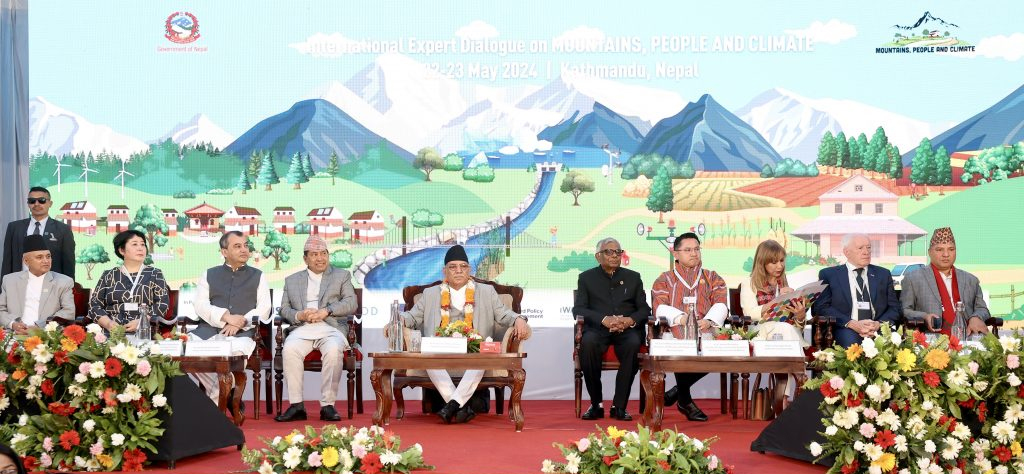 The Nepal Weekly
The Nepal Weekly  June 4, 2024
June 4, 2024
The two-day “International Expert Dialogue on Mountain, People and Climate” concluded at Chandragiri Hills in Kathmandu on May 23. The main objective of this expert dialogue was to draw the attention of the international community regarding the effects of climate change on Nepal’s mountains. The International Dialogue of Experts drew world attention saying that the ecosystems of the Himalayan and low coastal areas are at high risk of climate change. In addition, the dialogue underscored need for raising a unified voice globally for its solution. In the summary paper released after the dialogue, issues such as sustaining the lives and livelihoods of people living in mountainous and low-lying coastal areas, contributing less to carbon emissions, and raising a unified voice to reduce the unequal impact on less able countries are mentioned.
In the dialogue, 250 experts from different 25 countries, including Nepal, discussed and expressed their views on reducing the effects of climate. Each session had a keynote speaker, presentations on different topics and group discussions. During all the sessions, more than 50 international speakers participated and expressed their views in their field of expertise.
Besides Prime Minister Pushpa Kamal Dahal “Prachanda”, Deputy Prime Minister and Minister of Foreign Affairs Narayan Kaji Shrestha, Minister of Agriculture and Livestock of the Royal Government of Bhutan Yonten Phuntsho, Minister for Environment, Forestry and Climate Change of Bangladesh Saber Hossain Chowdhary, Chair of the UNFCCC Subsidiary Body for Scientific and technological Advice Harry Vreuls, Chief Secretary Government of Nepal Baikuntha Aryal, Diplomatic Mission here Heads and officials as well as special category officials of Nepal government were present during the occasion.
The dialogue was inaugurated on May 22 by chief guest Prime Minister ‘Prachanda’ during a special ceremony. After the inauguration, 10 sessions of various genres were conducted based on three major thematic areas. Addressing the dispute Prime Minister Prachanda said that “the problems that have arisen in mountainous countries due to climate change should be addressed”. Emphasizing the need to distribute sufficient, predictable and accessible funds and technology based on science under local leadership, Minister Dahal said that the issue of full operation of loss and damage fund in an equal and transparent manner should be prioritized. He said, “We request that the most vulnerable women, youth, children, people with disabilities, tribes and local communities living in the mountains should be prioritized for climate action.” He informed that Nepal is fully committed to the Paris Agreement and aims to achieve zero greenhouse gas emissions by 2045, five years ahead of the global target.
Harry Vireau, Chair of the UNFCCC Subsidiary Body for Scientific and Technological Advice (SBSTA), emphasized the increasing incidence of climate-induced disasters such as floods and landslides, calling for collective solutions to address these challenges. Similarly, Yonten Phuntsho, Minister for Agriculture and Livestock of The Royal Government of Bhutan, remarked, “As we convene here to commemorate the historic achievement of including mountain issues in the context of COP28 in Dubai, we are assembled to deliberate and chart out efforts to address the challenges faced by mountains and acknowledge the critical roles they play in mitigating climate change.” Saber Hossain Chowdhury, Minister for Environment, Forest and Climate change Bangladesh said, the developed countries emit 81 percent of the total global carbon emissions. Developing countries like Nepal and Bangladesh are facing problems due to this. Minister Chowdhury also stressed the importance of managing the budget required for implementing climate change adaptation programs. (By Pratima Sapkota)

